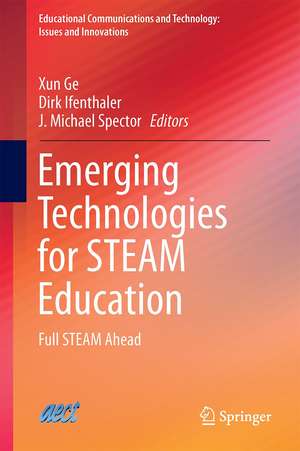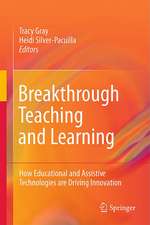Emerging Technologies for STEAM Education: Full STEAM Ahead: Educational Communications and Technology: Issues and Innovations
Editat de Xun Ge, Dirk Ifenthaler, J. Michael Spectoren Limba Engleză Hardback – 16 sep 2015
Included in the coverage:
- Reconceptualizing a college science learning experience in the new digital era.
- Using mobile devices to support formal, informal, and semi-formal learning.
- Change of attitudes, self-concept, and team dynamics in engineering education.
- The language arts as foundational for science, technology, engineering, art, and mathematics.
- Can K-12 math teachers train students to make valid logical reasoning?
- Moving forward with STEAM education research.
Emerging Technologies for STEAM Education equips educators, education researchers, administrators, and education policymakers with curricular and pedagogical strategies for making STEAM education the bedrock of accessible, relevant learning in keeping with today's digital advances.
| Toate formatele și edițiile | Preț | Express |
|---|---|---|
| Paperback (1) | 1070.72 lei 6-8 săpt. | |
| Springer International Publishing – 22 oct 2016 | 1070.72 lei 6-8 săpt. | |
| Hardback (1) | 1076.62 lei 6-8 săpt. | |
| Springer International Publishing – 16 sep 2015 | 1076.62 lei 6-8 săpt. |
Din seria Educational Communications and Technology: Issues and Innovations
- 18%
 Preț: 860.84 lei
Preț: 860.84 lei - 15%
 Preț: 620.07 lei
Preț: 620.07 lei -
 Preț: 370.26 lei
Preț: 370.26 lei - 15%
 Preț: 622.11 lei
Preț: 622.11 lei - 18%
 Preț: 755.90 lei
Preț: 755.90 lei - 18%
 Preț: 972.77 lei
Preț: 972.77 lei - 18%
 Preț: 1076.49 lei
Preț: 1076.49 lei - 15%
 Preț: 624.46 lei
Preț: 624.46 lei - 15%
 Preț: 617.89 lei
Preț: 617.89 lei - 18%
 Preț: 963.50 lei
Preț: 963.50 lei -
 Preț: 370.84 lei
Preț: 370.84 lei - 18%
 Preț: 909.51 lei
Preț: 909.51 lei - 18%
 Preț: 914.52 lei
Preț: 914.52 lei - 18%
 Preț: 905.13 lei
Preț: 905.13 lei - 18%
 Preț: 970.03 lei
Preț: 970.03 lei - 18%
 Preț: 961.83 lei
Preț: 961.83 lei -
 Preț: 345.22 lei
Preț: 345.22 lei - 18%
 Preț: 1066.17 lei
Preț: 1066.17 lei - 18%
 Preț: 967.29 lei
Preț: 967.29 lei - 18%
 Preț: 977.61 lei
Preț: 977.61 lei
Preț: 1076.62 lei
Preț vechi: 1312.95 lei
-18%
Puncte Express: 1615
Preț estimativ în valută:
190.43€ • 226.19$ • 165.83£
190.43€ • 226.19$ • 165.83£
Carte tipărită la comandă
Livrare economică 28 martie-11 aprilie
Specificații
ISBN-13: 9783319025728
ISBN-10: 3319025724
Pagini: 210
Ilustrații: XVI, 411 p. 36 illus., 17 illus. in color.
Dimensiuni: 155 x 235 x 24 mm
Greutate: 0.77 kg
Ediția:1st ed. 2015
Editura: Springer International Publishing
Colecția Springer
Seria Educational Communications and Technology: Issues and Innovations
Locul publicării:Cham, Switzerland
ISBN-10: 3319025724
Pagini: 210
Ilustrații: XVI, 411 p. 36 illus., 17 illus. in color.
Dimensiuni: 155 x 235 x 24 mm
Greutate: 0.77 kg
Ediția:1st ed. 2015
Editura: Springer International Publishing
Colecția Springer
Seria Educational Communications and Technology: Issues and Innovations
Locul publicării:Cham, Switzerland
Public țintă
ResearchCuprins
Forward.- Introduction to the general problem area and the landscape of various concerns and issues.- What happens when portable devices are introduced in schools and colleges on a large scale?.- What happens when learners are moving from one location to another and working with others who may not be enrolled or following a similar curriculum?.- Education, training, competencies, curricula and technology.- Reconceptualizing a college engineering curriculum based on 21st century skills.- Reconceptualizing a high school science curriculum based on 21st century skills.- Reconceptualizing a college liberal arts curriculum based on 21st century skills.- Reconceptualizing a middle school mathematics curriculum based on 21st century skills.- Authentic Learning and Meaningful Assessments.- Learning in and about Complex Domains.- Technologies Gone Awry.- Technologies that Show Potential to Improve Learning and Instruction.- Afterword.
Notă biografică
Xun Ge is Professor of Instructional Psychology and Technology and Chair of the Department of Educational Psychology, Jeannine Rainbolt College of Education, the University of Oklahoma. She holds a Ph.D. in Instructional Systems from the Pennsylvania State University. Dr. Ge’s primary research interest involves scaffolding students’ complex and ill-structured problem solving and selfregulated learning through designing instructional scaffolds, cognitive tools, learning technologies, and open learning environments (including virtual learning community, game-based learning, inquiry-based learning, and problem-based learning). Over the past years, her scholarly works has evolved to link cognition to motivation. Dr. Ge is also interested in studying the impact and assessment of game-based learning in supporting complex, ill-structured problem solving. Dr. Ge has extensive research experience in STEM education, and she has collaborated with scholars from diverse disciplines around the world. Dr. Ge’s research has been published in a co-edited book published by Springer, multiple book chapters in some highly regarded books, and numerous articles in many leading journals of the field, not to mention many other conference proceeding papers. Dr. Ge has been recognized for three prestigious awards she has received—2012 Outstanding Journal Article, 2004 Outstanding Journal Article 2003, and Young Scholar awarded by Educational Technology Research & Development and the American Educational Communications and Technology.
Dirk Ifenthaler is Professor for Instructional Design and Technology at theUniversity of Mannheim, Germany as well as an Adjunct Professor at Deakin University, Australia. His previous roles include Professor and Director, Centre for Research in Digital Learning at Deakin University, Australia, Manager of Applied Research and Learning Analytics at Open Universities Australia, and Professor for Applied Teaching and Learning Research at the University of Potsdam, Germany. Dirk was a 2012 Fulbright Scholar-in-Residence at the Jeannine Rainbolt College of Education, at the University of Oklahoma, USA. Professor Ifenthaler’s research focuses on the intersection of cognitive psychology, educational technology, learning science, data analytics, and computer science. He developed automated and computer-based methodologies for the assessment, analysis, and feedback of graphical and natural language representations, as well as simulation and game environments for teacher education. His research outcomes include numerous co-authored books, book series, book chapters, journal articles, and international conference papers, as well as successful grant funding in Australia, Germany, and USA—see Dirk’s website for a full list of scholarly outcomes at www.ifenthaler. info. Professor Ifenthaler is the Editor-in-Chief of the Springer journal Technology, Knowledge and Learning (www.springer.com/10758). Dirk is the Past-President for the AECT Design and Development Division, 2013–2015 Chair for the AERA Special Interest Group Technology, Instruction, Cognition and Learning and Co-Program Chair for the international conference on Cognition and Exploratory Learning in the Digital Age (CELDA).
J. Michael Spector is a Professor of Learning Technologies at the University of North Texas. Previously he was a Professor of Educational Psychology and Instructional Technology at the Learning and Performance Support Laboratory at the University of Georgia, Associate Director of the Learning Systems Institute at Florida State University, and Chair of Instructional Design, Development and Evaluation at Syracuse University. Prior to that, he was Director of the Educational Information Science and Technology Research Program at the University of Bergen, and the Senior Scientist for Instructional Systems Research at Armstrong Laboratory. He earned a Ph.D. in Philosophy from The University of Texas at Austin. His research focuses on intelligent support for instructional design, assessing learning in complex domains, and technology integration in education. Dr. Spector served on the International Board of Standards for Training, Performance and Instruction (ibstpi). He is a Past-President of the Association for Educational and Communications Technology and a Past-Chair of the Technology, Instruction, Cognition and Learning Special Interest Group of AERA. He is editor of Educational Technology Research & Development and edited the third and fourth editions of the Handbook of Research on Educational Communications and Technology, as well as theEncyclopedia of Educational Technology.
Dirk Ifenthaler is Professor for Instructional Design and Technology at theUniversity of Mannheim, Germany as well as an Adjunct Professor at Deakin University, Australia. His previous roles include Professor and Director, Centre for Research in Digital Learning at Deakin University, Australia, Manager of Applied Research and Learning Analytics at Open Universities Australia, and Professor for Applied Teaching and Learning Research at the University of Potsdam, Germany. Dirk was a 2012 Fulbright Scholar-in-Residence at the Jeannine Rainbolt College of Education, at the University of Oklahoma, USA. Professor Ifenthaler’s research focuses on the intersection of cognitive psychology, educational technology, learning science, data analytics, and computer science. He developed automated and computer-based methodologies for the assessment, analysis, and feedback of graphical and natural language representations, as well as simulation and game environments for teacher education. His research outcomes include numerous co-authored books, book series, book chapters, journal articles, and international conference papers, as well as successful grant funding in Australia, Germany, and USA—see Dirk’s website for a full list of scholarly outcomes at www.ifenthaler. info. Professor Ifenthaler is the Editor-in-Chief of the Springer journal Technology, Knowledge and Learning (www.springer.com/10758). Dirk is the Past-President for the AECT Design and Development Division, 2013–2015 Chair for the AERA Special Interest Group Technology, Instruction, Cognition and Learning and Co-Program Chair for the international conference on Cognition and Exploratory Learning in the Digital Age (CELDA).
J. Michael Spector is a Professor of Learning Technologies at the University of North Texas. Previously he was a Professor of Educational Psychology and Instructional Technology at the Learning and Performance Support Laboratory at the University of Georgia, Associate Director of the Learning Systems Institute at Florida State University, and Chair of Instructional Design, Development and Evaluation at Syracuse University. Prior to that, he was Director of the Educational Information Science and Technology Research Program at the University of Bergen, and the Senior Scientist for Instructional Systems Research at Armstrong Laboratory. He earned a Ph.D. in Philosophy from The University of Texas at Austin. His research focuses on intelligent support for instructional design, assessing learning in complex domains, and technology integration in education. Dr. Spector served on the International Board of Standards for Training, Performance and Instruction (ibstpi). He is a Past-President of the Association for Educational and Communications Technology and a Past-Chair of the Technology, Instruction, Cognition and Learning Special Interest Group of AERA. He is editor of Educational Technology Research & Development and edited the third and fourth editions of the Handbook of Research on Educational Communications and Technology, as well as theEncyclopedia of Educational Technology.
Textul de pe ultima copertă
This theory-to-practice guide offers leading-edge ideas for wide-scale curriculum reform in sciences, technology, engineering, the arts, and mathematics--the STEAM subjects. Chapters emphasize the critical importance of current and emerging digital technologies in bringing STEM education up to speed and implementing changes to curricula at the classroom level. Of particular interest are the diverse ways of integrating the liberal arts into STEM course content in mutually reshaping humanities education and scientific education. This framework and its many instructive examples are geared to ensure that both educators and students can become innovative thinkers and effective problem-solvers in a knowledge-based society.
Included in the coverage:
Emerging Technologies for STEAM Education equips educators, education researchers, administrators, and education policymakers with curricular and pedagogical strategies for making STEAM education the bedrock of accessible, relevant learning in keeping with today's digital advances.
Included in the coverage:
- Reconceptualizing a college science learning experience in the new digital era.
- Using mobile devices to support formal, informal, and semi-formal learning.
- Change of attitudes, self-concept, and team dynamics in engineering education.
- The language arts as foundational for science, technology, engineering, art, and mathematics.
- Can K-12 math teachers train students to make valid logical reasoning?
- Moving forward with STEAM education research.
Emerging Technologies for STEAM Education equips educators, education researchers, administrators, and education policymakers with curricular and pedagogical strategies for making STEAM education the bedrock of accessible, relevant learning in keeping with today's digital advances.
Caracteristici
Gives insights into the STEAM domains Covers international collaborations and current perspectives on issues in practice Concrete examples provided for the implementation of a STEAM curriculum




